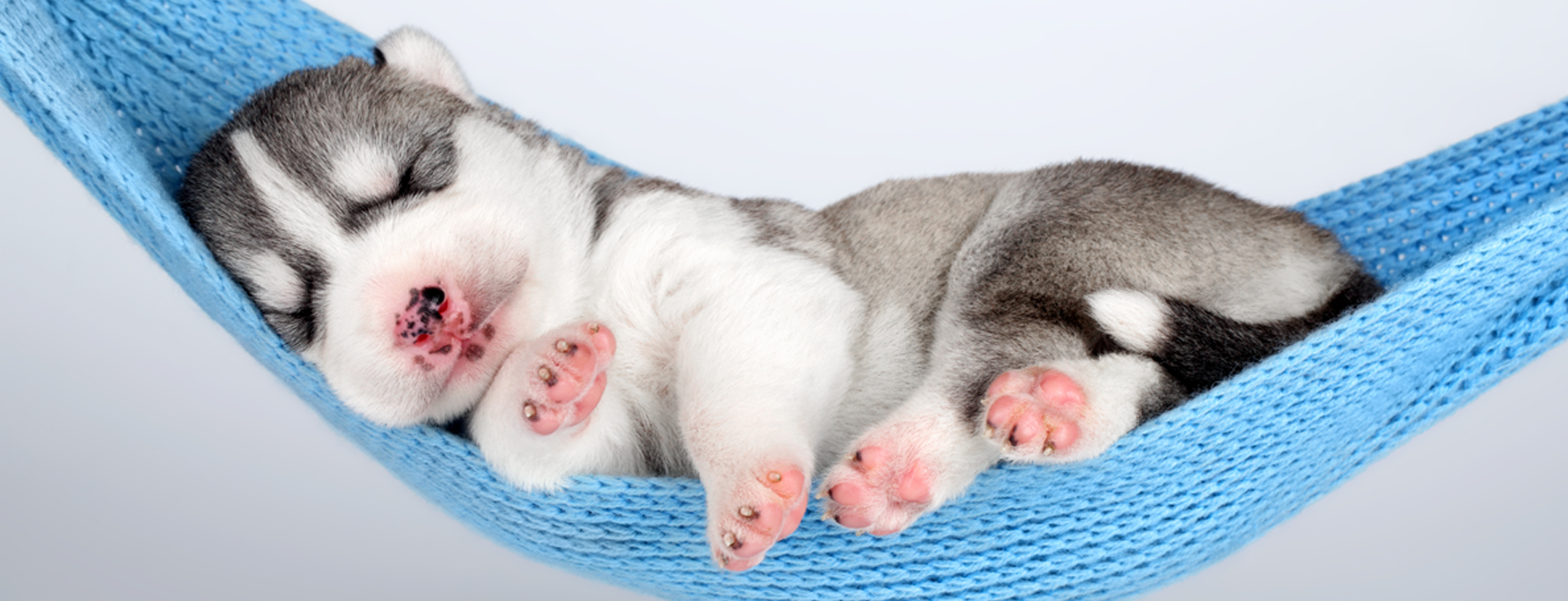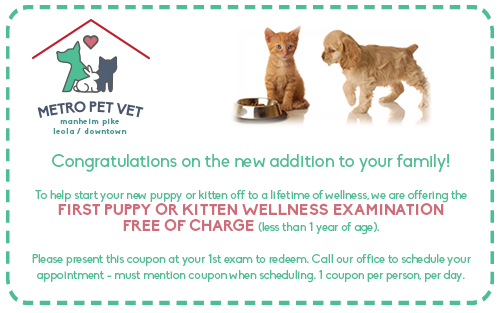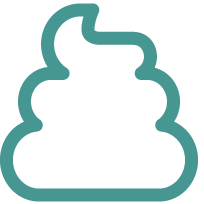
New puppy?
We want to make your puppy’s visits to us as relaxed as possible.You can help us by preparing your puppy for this.
Getting Started
- Brushing their teeth, handling their feet and touching their ears will make our nose to tail examinations easier.
- Help them adjust to getting their nails trimmed by manipulating each toe individually many times a day and always make the puppy behave during this time.
- At first, make these sessions short then gradually lengthen them.
- Handling their ears may make future ear cleaning easier.
Always make these sessions a positive experience and reward your puppy for being good.

Click here to print the coupon.![]()
Here are some of the ways we can take care of your new pup:

Preventative Care Exam
A thorough physical exam is the most important part of your puppy’s visit. They will receive an exam from nose to tail. We want to be certain they are healthy before any vaccinations would be given.

Heartworm Prevention
Heartworm prevention is recommended to be given all year. A blood test will be needed regularly as an adult to insure that the medicine is working. Heartworms are parasites in the blood that are spread by mosquitoes. An infected mosquito bites your dog and the heartworm larva enters their system. The larva grows in the body for seven months before lodging in the heart itself. This causes heart damage and, if severe enough, heart failure.
Giving your pet a monthly preventative tablet all year for the rest of their life is the only way to prevent this deadly disease. Although this disease is endemic in the southern part of the country due to their mild winters; we still occasionally see heartworm positive dogs in this state.

Fecal Sample
A fecal sample should be checked once a year on all pets. The most common intestinal parasites are roundworms, hookworms, whipworms and coccidia. Roundworms infect most puppies, but they do not show up in every fecal sample. Puppies can be exposed to intestinal parasites in a number of ways: in utero, from other littermates or from their mother. Roundworms can also cause disease in humans, especially young children. For this reason, your puppy will be dewormed at their first visit, even if the fecal is negative.
The fecal is still important to identify any other parasites and determine the proper medications. Some intestinal worms can encyst in the wall of the intestine when your puppy is young and will be released to infect your pet during times of stress. For this reason, the CDC mandates that all pets should have a stool sample checked every six to twelve months. The monthly heartworm preventative will also deworm your pet for two of the major intestinal parasites seen in dogs. This is why we recommended giving preventative year round, not just in the months you see mosquitos.

Nutrition
Nutrition is an important part of your puppy’s health. Many dogs have sensitive gastrointestinal tracts and become ill easily if their diet changes in any way. It is best to choose a quality food that is readily available and consistently feed that diet. Table scraps and bones are not recommended and often make dogs seriously ill.
It is important to use a measuring cup to feed your puppy a specific amount each day. Measuring a daily ration will allow easier evaluation of the actual amount your puppy is eating. This system is especially important if your puppy is ill or if weight management becomes an issue as an adult dog. As a puppy, if you can meal feed (usually 2-3 times per day) rather than feeding free choice, it will help with house training. Most puppies have a bowel movement 15-30 minutes post eating. We recommend the following brands of food:
- Hill’s Science Diet
- Royal Canin
- Eukanuba
- Purina ONE or ProPlan formulas

Neutering
Neutering your pet has many important health benefits. They include eliminating ovarian cancer, testicular cancer, uterine cancer and uterine infections. It dramatically decreases the incidence of mammary cancer and prostate issues if done at a young age. It also virtually eliminates over-population problems. We recommend neutering your pet at approximately 6 months of age. The health benefits are the greatest if females are spayed before their first heat cycle. Aggression, roaming and marking behaviors can be greatly reduced or even eliminated by castrating a dog, even an older dog.

Dental Disease
Dental disease is often an overlooked part of pet care. This young age is the perfect time to get your pet accustomed to having its teeth brushed. Start by handling your puppy’s mouth often. Lift the lips and open the mouth while constantly reassuring and talking to your puppy. However, if they struggle too much or are nibbling and biting you even if playing, they must be firmly held and given a firm “NO.”
Never give up when the puppy is not cooperating or they will think they have “won” and future training sessions may be more difficult. Always end on a positive note when the puppy has done something well. As they grow accustomed to this exercise, you can begin rubbing the gums gently with your fingers. Gradually over weeks or months, you can progress to using a toothbrush and special pet toothpaste. Do not use human toothpaste, as the fluoride content is too high for dogs.

Flea and Tick Control
We have very effective, safe and easy solutions to controlling fleas and ticks on your puppy. We offer several topical or oral products that can protect your new companion. At your puppy’s visit with the veterinarian, we will discuss their individual risks and find the perfect product to keep your puppy flea and tick free! There are many copycat products that are simply flea sprays packaged to look like brand name products but since these are totally unregulated they could potentially cause harm to your pet.

Puppy Classes
Puppy classes and obedience training will benefit ALL pets and their owners. These classes can usually be started after the first series of vaccines, as early as 8 weeks of age. This is not formal obedience training, but just an introduction to the basics of training, socialization and developing good habits for both of you. A puppy has a small window of time to learn important socialization skills; a puppy class is invaluable to attend at this critical age before that window closes. It should be lots of fun for both of you and the time together is well spent.
You will come to find out that getting a puppy is only the beginning. If you follow these guidelines, your puppy may have a greater chance of leading a healthy and happy life. Puppies take time, but it is time well spent. You may have many questions in the beginning and the teams at Manheim Pike Veterinary Hospital and Leola Veterinary Hospital will always be here to answer them.

